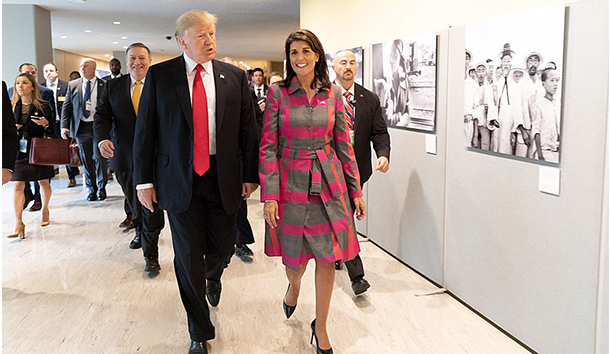President Donald Trump’s speech to the U.N. General Assembly on September 25 was met with audible disrespect from some of the assembled globalist cognoscenti (representatives of many barbarous regimes included), and with blind hostility from the media and commentariat. This was unsurprising, because the opening segment of his half-hour address sounded like the summary of a sound, conservative foreign-policy doctrine.
“We reject the ideology of globalism, and we embrace the doctrine of patriotism around the world,” Trump declared. Responsible nations must defend themselves against threats to their sovereignty from all forms of coercion and domination:
I honor every nation to pursue its own customs, beliefs and traditions. The United States will not tell you how to live or work or worship. We only ask that you honor our sovereignty in return. . . . Migration should not be governed by an international body, unaccountable to our own citizens. . . . Virtually everywhere socialism or communism has been tried, it has produced suffering, corruption, and decay.
So far, so splendid. Trump’s words contained the doctrinal outline of a grand strategy based on enlightened self-interest, with the United States finally returning to her traditional pre-1941 role—ingloriously interrupted by Woodrow Wilson at Versailles in 1919—as a power among the powers. Ever since Monroe, America had acted as a hegemon in the Western hemisphere, but she was commendably loath to go around the world in search of dragons to slay. Even the role of a globally engaged superpower in the bipolar Cold War world arguably was imposed by a less-than-manifest destiny. The neoconservative-neoliberal quest for permanent war in pursuit of permanent global dominance is a horrid aberration, however, which Trump was elected to end.
Unfortunately, all was not well with the President’s speech. The problem is threefold. First, the rest of Trump’s speech—dealing with specific issues around the world—was at odds with his stated overall principles. Second, miscellaneous U.S. policies—not enumerated in Trump’s speech, but of great import to the global scene—are also at odds with the realist-sovereignist paradigm. Third, Trump’s own team—not to mention the bureaucratic apparat through which it functions—is not attuned to his declared grand design.
Contrary to Trump’s stated respect for the sovereign decisions of nations (and inappropriately for the venue), the President warned that Germany would “become totally dependent on Russian energy if it does not immediately change course,” i.e., terminate the Nord Stream 2 pipeline project. It is none of America’s business to pontificate on Germany’s energy policy, and even less so to follow this up with a sales pitch for U.S. oil and gas, as the President did at the U.N. rostrum.
More alarmingly, Trump launched an all-out attack on “the corrupt dictatorship in Iran” in unprecedentedly harsh language. This was contrary to the spirit of Trump’s opening statement, but in line with his administration’s long-established policy of imposing demands on Iran that are literally impossible for a sovereign government to accept (see my July column). That nothing much will change in the Middle East was also clear from subsequent statements by Defense Secretary Mattis and others that U.S. troops will now stay in Syria—and thus violate that country’s sovereignty—in order to counter Iranian influence, which is to say troops are there permanently.
The second group of problems, policies not mentioned by Trump but contrary to his stated principles, is illustrated by the administration’s unprecedented decision to sanction the Chinese government—specifically the military procurement agency and its director—for buying Russian fighter jets and the Russian-made S-400 air defense missile system. In response, China’s foreign ministry summoned U.S. Ambassador in Beijing Terry Branstad to lodge “stern representations” on September 22. China also announced a postponement of high-level bilateral military talks scheduled for October. (Three days later the Chinese government denied the U.S.S. Wasp permission to pay a port visit to Hong Kong.) China’s defense-ministry spokesman said that China’s decision to buy fighter jets and missile systems from Russia was a normal act of cooperation between sovereign countries, and the United States had “no right to interfere.” Such haughty U.S. behavior defies belief. Hostile to both Russia and China in equal measure, it reflects a hegemonistic mind-set on steroids tinged with plain stupidity and the absence of strategic sense.
The most formidable obstacle to the President’s U.N. speech developing into a “Trump Doctrine,” however, is the solid resistance of the Swamp (a.k.a. Deep State, Permanent State, etc.) to its ideological foundation and practical implications. This is truly unprecedented.
The Truman Doctrine of containment, announced in 1947, could be systematically developed because its key tenets were accepted by the political establishment and applied by the government apparatus. The Reagan Doctrine—comprehensively to undermine and roll back Soviet positions everywhere—encountered much resistance from the liberal left, but it was eventually internalized by all key segments of the diplomatic, military, and national-security apparatus. (Bill Clinton’s, George W. Bush’s, and Barack Obama’s foreign policies were never supported by a clear statement of doctrinal intent.)
Donald Trump does not enjoy such luxury. The Department of State, the FBI, and the CIA are all wasps’ nests of Trumpophobic zealots. Most of his closest aides are neocons and global hegemonists. It would be in the American interest that he carry out a great purge, which would make the Trump Doctrine of Sovereign Realism possible. Tragically, two years after Trump’s election victory, that possibility appears increasingly remote with each passing month.



Leave a Reply